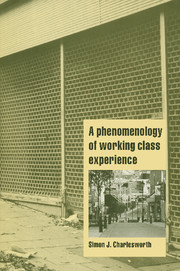Book contents
- Frontmatter
- Contents
- Acknowledgements
- 1 Introduction: Dead Man's Town
- 2 Rotherham: history, demography and place
- 3 Class and the objectifying subject: a reflexive sociology of class experience
- 4 A landscape with figures?
- 5 Understanding the barriers to articulation
- 6 Necessity and being working class
- 7 The culture of necessity and working class speech
- 8 Conclusion
- Notes
- References
- Index
7 - The culture of necessity and working class speech
Published online by Cambridge University Press: 22 September 2009
- Frontmatter
- Contents
- Acknowledgements
- 1 Introduction: Dead Man's Town
- 2 Rotherham: history, demography and place
- 3 Class and the objectifying subject: a reflexive sociology of class experience
- 4 A landscape with figures?
- 5 Understanding the barriers to articulation
- 6 Necessity and being working class
- 7 The culture of necessity and working class speech
- 8 Conclusion
- Notes
- References
- Index
Summary
Their conversation is like a gently wicked dance: sound meets sound, curtsies, shimmies, and retires. Another sound enters but is upstaged by still another: the two circle each other and stop … The edge, the curl, the thrust of their emotions is always clear to Frieda and me. We do not, cannot, know the meanings of all their words, for we are nine and ten years old. So we watch their faces, their hands, their feet, and listen for truthin timbre.
(Morrison 1990: 10)In attempting to understand working class experience, Bourdieu warns that we must be careful not to ‘leave out the relation to class condition which is part of a complete definition of that condition’ (Bourdieu 1984: 372). And Bourdieu goes on to say that intellectuals usually apprehend ‘the working class condition through schemes of perception and appreciation which are not those that the members of the working class themselves use to apprehend it' (Bourdieu 1984: 373). Rather, we need to understand the habitus which is ‘normally (i.e., with a high statistical probability) associated with that position’ (Bourdieu 1984: 372). We have already established how this is to be rendered and considered the resources that allow us to understand their relation to their condition. Here, the insights of Merleau-Ponty concerning the nature of pre-reflective, antepredicative experience are helpful.
- Type
- Chapter
- Information
- A Phenomenology of Working-Class Experience , pp. 203 - 274Publisher: Cambridge University PressPrint publication year: 1999



